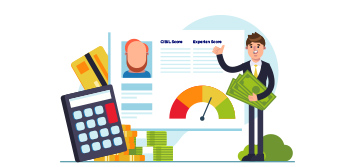Experian Credit Information Report
Experian Credit Information Report (CIR) is a detailed summary of your credit history including your credit accounts, personal information, and history of repayment. This serves as an essential financial metric to assess your creditworthiness. Lenders use the CIR to evaluate the risk involved with extending a credit facility to a borrower.
Experian Credit Score Range
The Experian credit score range follows between 300 and 900. While a good credit score between 670 and 739 makes you a creditworthy individual, a higher score over 800 can make you eligible for attractive loan offers.
Components of Experian Credit Information Report
- Personal Information
Your personal information as per your PAN card. - Experian Credit Score
Your 3-digit credit score calculated by Experian. - Credit History
A comprehensive summary of your credit account. - Credit Inquiries
A detailed report on all hard and soft inquiries. - Non-credit Inquiries
Non-credit inquiries made in the past 7, 30, 90 and 180 days. - Credit Account Summary
A report of all your credit cards and loans. - Current Balance Account Summary
Information on settled and balance amount.
How to Check Experian Credit Score Online?
Check your Experian credit score in just 2 minutes:
- Step 1: Click on “Get Your Experian Score”.
- Step 2: Enter your name, phone number, and email address.
- Step 3: Enter the OTP and click ‘Check Score Now’.
Your Experian credit score will be displayed instantly.
Importance of Experian Credit Report
- Assessment of Creditworthiness
Lenders or financial institutions assess your credit report before extending you any new loan or credit card. A favourable credit report and a good credit score can help you obtain better loan terms including a flexible repayment term, lower interest rates and higher loan amount. - Protection of Identity
Regularly checking your credit report can help identify any unauthorised access inquiries or discrepancies in personal information. This can help you address the issue immediately by raising a dispute with Experian. - Financial Management
Your credit information report from Experian summarises your history of credit accounts, payment records and outstanding debts. Going through this information helps you to understand your financial standing better, improving your financial management skills. - Employment Opportunities
In many job roles such as a financial advisor or an investment banker, employers may run a credit report check as a part of their hiring process. This helps them to assess how well you can manage financial responsibilities. A strong credit report can help you avail new doors of career growth opportunities.
Benefits of Getting Your Experian Credit Report
Regularly monitoring your Experian report can help you sustain your financial health and avail financial security. The following 4 points highlight the benefits of having a credit report:
- Detection of Errors
Your credit report helps you identify any errors or inaccuracies regarding your personal information or credit account details. It further helps to dispute unauthorised access to your credit report or unfamiliar hard inquiries which can otherwise negatively impact your credit score. - Accuracy in Credit information
Receiving your credit report helps to ensure that the information lenders can see is correct. It helps you to verify your personal information, payment history and credit account details for accuracy. - Chances to Improve Credit Score
Going through your credit file helps you understand the factors that affect your credit score. This will, therefore, help you take significant steps to improve your Experian score, which may include paying off your debts on time or early or diversifying your credit mix. - Loan and Credit Applications
It helps you understand your financial circumstances. Knowing this information about credit standing before applying for a new line of credit helps you negotiate better loan terms while increasing your chances of approval.
Factors Influencing Your Experian Score
Your Experian score is influenced by factors such as payment history, credit mix, and more. Take a look at the following points to learn how these factors affect your score:
- Payment History
Payment history adds up to 35% of your Experian score, placing an immense significance on timely repayments. Late payments or defaults can significantly harm your credit score, while timely or early repayments can boost it. - Credit Utilisation
A high Credit Utilisation Ratio (CUR), which is the ratio of your current credit card balances relative to your credit limits, can strain your financial health. Hence, maintaining a CUR of 30% or below demonstrates your strong financial management abilities. - Length of Credit History
A positive and longer Experian credit history reflecting timely repayments, past credit accounts, and responsible credit management abilities helps boost your credit scores. Hence, ensure to keep your past fully paid credit accounts open to lengthen your credit report. - Credit Mix
Exhibiting a healthy mix of credit in your credit file demonstrates strong credit management skills. Having a healthy mix of credit cards, instalment loans, Personal Loans and mortgages helps to boost your credit score. - New Credit Applications
Multiple applications for new credit in a short period generate multiple hard inquiries, which temporarily lower your score. Avoid applying for too many new credit facilities within a short time.
How to Improve your Experian Credit Score
Improving your credit score can help you access better loan terms and improve your overall financial health. Check out the following tips to improve your Experian credit score over time:
- Timely Repayments of Bills
Make sure all your credit card dues and outstanding loan amounts are paid off on or before the due date. To avoid payment delays, set up payment reminders or automatic payments. - Diversify Your Credit Mix
Maintain a healthy credit mix, including instalment or auto loans, Business Loans, Personal Loans and mortgage loans. Responsible management of multiple credit facilities will improve your Experian credit score while making you eligible for attractive loan terms. - Apply for New Credit When Needed
Avoid new credit applications as much as possible. Applying for credit only when necessary can prevent potential financial strains and improve your credit score. - Monitor Your Credit Report Regularly
Monitoring your credit report regularly can help to identify any error, discrepancy or potential identity theft at the earliest. This can help you address the issues immediately which may otherwise affect your scores. - Maintain a Low CUR
Try to maintain a credit utilisation ratio of 30% or below to achieve a good credit score. Moreover, getting access to higher credit limits can help you maintain lower utilisation across different accounts. - Keep Old Accounts Open
Keeping your old accounts open can help to maintain a longer credit history, which can help to increase your Experian score.
Why Do You Need to Have a Good Credit Score?
Maintaining a good credit score is beneficial for your financial health as it offers the following benefits:
- Lower Interest Rates
With higher Experian credit scores, you can become eligible for lower interest rates. This will help you save money on loans and credit cards, sustaining your financial health. - Higher Credit Limits
Good credit scores demonstrate your ability to manage finances responsibly. Hence, lenders can offer you higher credit limits. - Increased Chances of Approval
A high credit score increases your chances of getting approved for loans, helping you access funds when needed. - Financial Flexibility
With good credit scores leading to increased chances of approval, you can access funds at the earliest. This can help you meet your financial obligations without straining your financial health. - Better Negotiating Power
With a higher Experian score, you can leverage your strong financial management abilities to negotiate favourable loan terms. - Attractive Insurance Rates
Insurance companies often offer attractive interest rates to individuals with higher credit scores. This helps to save money on premium costs.
Frequently Asked Questions About Experian Score
The Experian Report Number (ERN) is a unique identifier for each credit report that is assigned by a creditor under the guidelines of Experian. It helps in tracking and referencing specific reports.
Your credit score is calculated by considering the five factors including your payment history, credit utilisation ratio, credit mix, new credit applications and length of credit history.
Your credit report is updated once a month, or at least every 45 days when lenders provide new information about your credit account to Experian.
As checking your own credit score generates a soft inquiry, it does not affect it.
The Experian CIR helps assess an individual's creditworthiness, helping financial institutions assess the risk involved with extending a new line of credit to them.
Yes, there may be inaccuracies in your Experian credit report due to factors such as unauthorised access, misreported information, systematic errors, etc. Hence, be sure to monitor your credit report regularly to identify these issues and report them as soon as possible.
You can dispute an inaccuracy in your credit report with Experian by visiting their official website, clicking on “raise a dispute”, and filling in the form for submission.
You may not have an Experian score because of insufficient length of credit history. This can happen when you have never taken out a loan or credit card or taken your first credit very recently. You can build your credit history by applying for a secured credit card or a credit-builder loan.
A credit inquiry or a credit check occurs when a lender or a financial institution requests to check your credit report before lending you a facility of credit.
Negative information like late payments or default stays on your credit report for 7 years.











